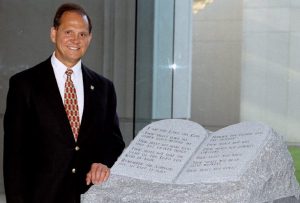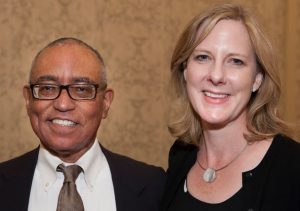Myron Thompson Wins Yale Law’s Award of Merit
In October, Yale Law School, at an alumni gathering in New Haven, bestowed upon our classmate, Myron Thompson (JE ’69, ’72 Law), its Award of Merit for his long record of distinguished service as a United States District Court judge in the Middle District of Alabama.
Since 1957, the Yale Law School Association has presented the Award of Merit annually to an esteemed graduate of Yale Law School or full-time member of the faculty. The recipients of the Award are recognized for having made a substantial contribution to public service or to the legal profession. Previous recipients include (among others): Eugene V. Rostow ’37 (1965), Potter Stuart ’41 (1968), Cyrus R. Vance ’42 (1971), Gerald R. Ford ’41 (1979), Eleanor Holmes Norton ’64 (1980), Ellen Ash Peters ’54 (1983), Benno Schmidt ’66 (1986), William J. Clinton ’73 (1993), Robert Rubin ’64 (1998), Joseph Lieberman ’67 (2001), Charles Reich ’52 (2008) and three US Supreme Court Justices (Thomas, Alito and Sotomayor) (2014).
Here is Dean Gerken’s presentation and Myron’s remarks (and humor) upon receiving the award:
Alumni Weekend 2017: Award of Merit from Yale Law School on Vimeo.
In her remarks, Dean Gerken covered a number of highlights of Myron’s storied career as a Federal jurist and closed with the following statements:
“In covering just a sampling of his life and career, it makes clear that the strength of his character helped overcome adversity in his own life and the lives of others, which is an attribute in the legal community that too often finds itself overshadowed by its own stars. Myron is impressive in every single way of the world. He’s a well respected judge with trophies and awards from dozens of law schools and legal organizations that would fill shelf after shelf. But I hope that as you leave today you remember that, for our profession, justice is equal parts brains and integrity. Myron is an example of the greatness you can achieve with both.”
Myron, throughout his life, has represented an extraordinary combination of courage and integrity. One of the last generation of children exposed to polio, Myron was stricken at an early age, bedridden at first, but fought back, ultimately being able to walk with only a minor limp when he was walking from JE to his classes. In his acceptance remarks (see video at 17:30), Myron said that the challenges of polio, as well as growing up in the Jim Crow South — going to segregated schools, using segregated water fountains, and being treated as sub human — made him who he is.
He also told the story of going to enrichment programs in the summers and, at age 15, in the summer of 1963, he was taught by a Yale Law Student volunteering during that “freedom summer.” (See video at 25:45.) That student brought Myron to New Haven for a visit, carrying Myron around, showing him the colleges and encouraging him to apply to Yale.
From 1972 to 1974, Myron served as an Assistant Attorney General of Alabama, the first African American to hold that position. After the following 6 years in private practice, Myron was appointed by President Jimmy Carter to the federal bench, where he has served for the past 37 years.
In a 2014 ruling, Thompson ruled an Alabama law regulating abortion unconstitutional, in Planned Parenthood Southeast, Inc., v. Strange (also known as Planned Parenthood Southeast, Inc., v. Bentley), citing the undue burden standard.
 More topically, given Roy Moore’s current newsworthiness, when Moore became chief justice, he ordered the placement of a 2.6-ton monument of the Ten Commandments in the rotunda of Alabama’s state judicial building. Judge Thompson ruled that the monument was a violation of the separation of church and state, but Moore declined to follow that court ruling and kept the monument in the building.
More topically, given Roy Moore’s current newsworthiness, when Moore became chief justice, he ordered the placement of a 2.6-ton monument of the Ten Commandments in the rotunda of Alabama’s state judicial building. Judge Thompson ruled that the monument was a violation of the separation of church and state, but Moore declined to follow that court ruling and kept the monument in the building.
“It is a sad day in our country when the moral foundation of our law and the acknowledgment of God has to be hidden from public view to appease a federal judge,” Moore said of the ruling shortly after it happened in 2003. He ended up being suspended by the Alabama Judicial Inquiry Commission for his failure to obey the court order. He was removed from office on Nov. 14, 2003, after all nine members of the Alabama judicial ethics panel voted unanimously in favor of doing so.
As the Yale Daily News noted in its coverage of the recent Award of Merit to Judge Thompson,
Linda Greenhouse LAW ’78, a Pulitzer Prize–winning reporter and a Yale lecturer in law, told the News that it was clear from an alumni lunch she attended that Thompson was a popular choice.
“The award of merit to Judge Myron Thompson was exceptionally well deserved,” said Greenhouse, who received the same award in 2007. “He represents the very best of the American judiciary in terms of intelligence, integrity and courage.”

